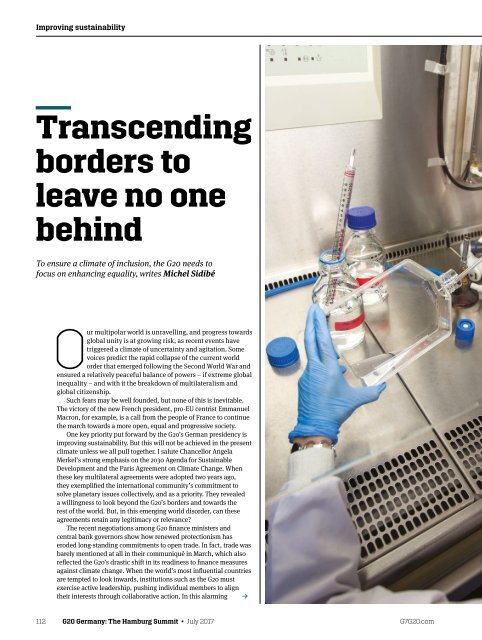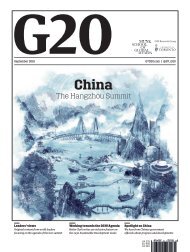G20-Germany-Hamburg-2017
mo.rami@trmg.co.uk
mo.rami@trmg.co.uk
You also want an ePaper? Increase the reach of your titles
YUMPU automatically turns print PDFs into web optimized ePapers that Google loves.
Improving sustainability<br />
Transcending<br />
borders to<br />
leave no one<br />
behind<br />
To ensure a climate of inclusion, the <strong>G20</strong> needs to<br />
focus on enhancing equality, writes Michel Sidibé<br />
Our multipolar world is unravelling, and progress towards<br />
global unity is at growing risk, as recent events have<br />
triggered a climate of uncertainty and agitation. Some<br />
voices predict the rapid collapse of the current world<br />
order that emerged following the Second World War and<br />
ensured a relatively peaceful balance of powers – if extreme global<br />
inequality – and with it the breakdown of multilateralism and<br />
global citizenship.<br />
Such fears may be well founded, but none of this is inevitable.<br />
The victory of the new French president, pro-EU centrist Emmanuel<br />
Macron, for example, is a call from the people of France to continue<br />
the march towards a more open, equal and progressive society.<br />
One key priority put forward by the <strong>G20</strong>’s German presidency is<br />
improving sustainability. But this will not be achieved in the present<br />
climate unless we all pull together. I salute Chancellor Angela<br />
Merkel’s strong emphasis on the 2030 Agenda for Sustainable<br />
Development and the Paris Agreement on Climate Change. When<br />
these key multilateral agreements were adopted two years ago,<br />
they exemplified the international community’s commitment to<br />
solve planetary issues collectively, and as a priority. They revealed<br />
a willingness to look beyond the <strong>G20</strong>’s borders and towards the<br />
rest of the world. But, in this emerging world disorder, can these<br />
agreements retain any legitimacy or relevance?<br />
The recent negotiations among <strong>G20</strong> finance ministers and<br />
central bank governors show how renewed protectionism has<br />
eroded long-standing commitments to open trade. In fact, trade was<br />
barely mentioned at all in their communiqué in March, which also<br />
reflected the <strong>G20</strong>’s drastic shift in its readiness to finance measures<br />
against climate change. When the world’s most influential countries<br />
are tempted to look inwards, institutions such as the <strong>G20</strong> must<br />
exercise active leadership, pushing individual members to align<br />
their interests through collaborative action. In this alarming<br />
112 <strong>G20</strong> <strong>Germany</strong>: The <strong>Hamburg</strong> Summit • July <strong>2017</strong> G7<strong>G20</strong>.com
















